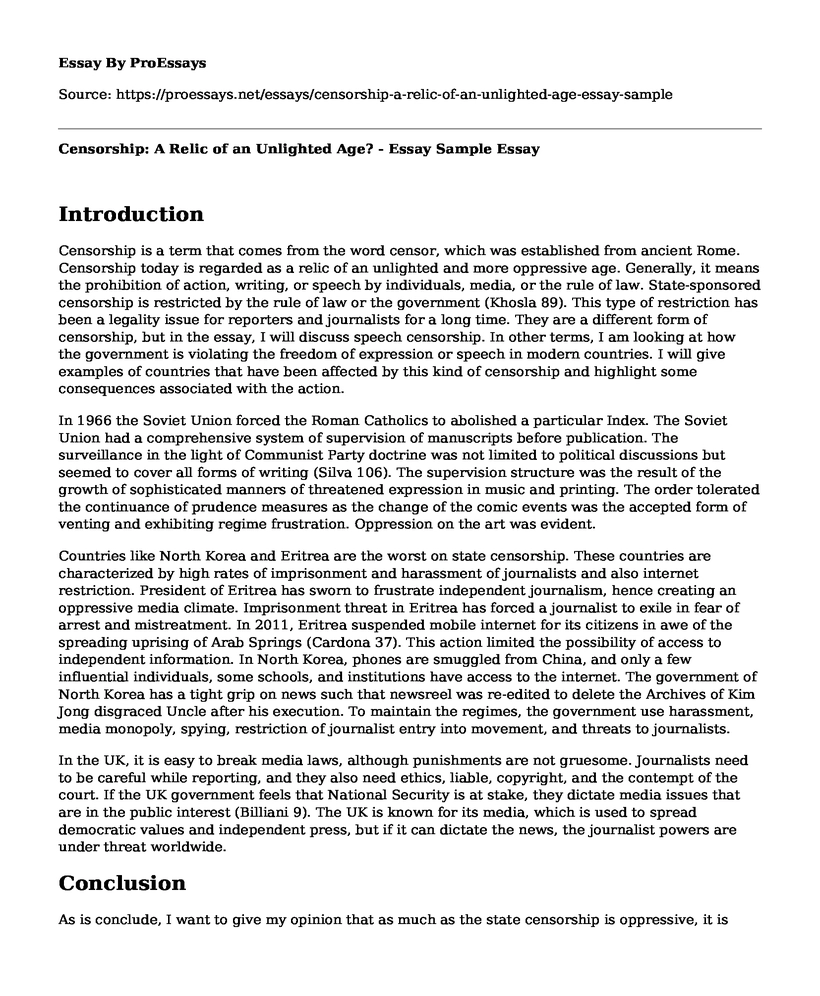Introduction
Censorship is a term that comes from the word censor, which was established from ancient Rome. Censorship today is regarded as a relic of an unlighted and more oppressive age. Generally, it means the prohibition of action, writing, or speech by individuals, media, or the rule of law. State-sponsored censorship is restricted by the rule of law or the government (Khosla 89). This type of restriction has been a legality issue for reporters and journalists for a long time. They are a different form of censorship, but in the essay, I will discuss speech censorship. In other terms, I am looking at how the government is violating the freedom of expression or speech in modern countries. I will give examples of countries that have been affected by this kind of censorship and highlight some consequences associated with the action.
In 1966 the Soviet Union forced the Roman Catholics to abolished a particular Index. The Soviet Union had a comprehensive system of supervision of manuscripts before publication. The surveillance in the light of Communist Party doctrine was not limited to political discussions but seemed to cover all forms of writing (Silva 106). The supervision structure was the result of the growth of sophisticated manners of threatened expression in music and printing. The order tolerated the continuance of prudence measures as the change of the comic events was the accepted form of venting and exhibiting regime frustration. Oppression on the art was evident.
Countries like North Korea and Eritrea are the worst on state censorship. These countries are characterized by high rates of imprisonment and harassment of journalists and also internet restriction. President of Eritrea has sworn to frustrate independent journalism, hence creating an oppressive media climate. Imprisonment threat in Eritrea has forced a journalist to exile in fear of arrest and mistreatment. In 2011, Eritrea suspended mobile internet for its citizens in awe of the spreading uprising of Arab Springs (Cardona 37). This action limited the possibility of access to independent information. In North Korea, phones are smuggled from China, and only a few influential individuals, some schools, and institutions have access to the internet. The government of North Korea has a tight grip on news such that newsreel was re-edited to delete the Archives of Kim Jong disgraced Uncle after his execution. To maintain the regimes, the government use harassment, media monopoly, spying, restriction of journalist entry into movement, and threats to journalists.
In the UK, it is easy to break media laws, although punishments are not gruesome. Journalists need to be careful while reporting, and they also need ethics, liable, copyright, and the contempt of the court. If the UK government feels that National Security is at stake, they dictate media issues that are in the public interest (Billiani 9). The UK is known for its media, which is used to spread democratic values and independent press, but if it can dictate the news, the journalist powers are under threat worldwide.
Conclusion
As is conclude, I want to give my opinion that as much as the state censorship is oppressive, it is right to some extent. Censorship help in managing cyber-crimes and maintaining state security. More so, the government restrict internet materials that are harmful to children, e.g., Pornography (Shadmehr and Dan 287). Organizations like Index on Censorship and World Association of Newspapers and News Publishers are fighting to promote and defend press freedom to stop the high level of state-sponsored censorship. Without freedom of speech, what can the world do?
Works Cited
Billiani, Francesca, ed. Modes of censorship: National contexts and diverse media. Routledge, 2014.
Cardona, Laura. "Modes of Censorship in the World's Five Most Censored Countries." International Review Spring 2017 (2017): 37.
Khosla, Tamanna. "Global Civil Society: Need for the Power to the People and Deliberative Democracy." Intellectual Resonance (2016): 89.
Shadmehr, Mehdi, and Dan Bernhardt. "State censorship." American Economic Journal: Microeconomics 7.2 (2015): 280-307.
Silva, David A. Alternative media portrayals of the Soviet Union and the Cold War from 1929-1933: The Boston Globe, Chicago Defender, Catholic World and Catholic Worker during the great depression and American-Soviet recognition. University of Massachusetts Boston, 2010.
Cite this page
Censorship: A Relic of an Unlighted Age? - Essay Sample. (2023, Mar 14). Retrieved from https://proessays.net/essays/censorship-a-relic-of-an-unlighted-age-essay-sample
If you are the original author of this essay and no longer wish to have it published on the ProEssays website, please click below to request its removal:
- Social Media Essay Example: Facebook as an Everyday Culture
- The Kingdom of Heaven Film Essay
- Sustainable Design of Skyscrapers
- Analysis of the Historical Meaning of the Movie the Battle of Algiers
- Analysis of Rembrandt's Paintings - Paper Example
- Essay Sample on Impact of Social Media on Teens Seven Years Apart
- Visual Art Renaissance Essay Example







